Use 'Print preview' to check the number of pages and printer settings.
Print functionality varies between browsers.
Printable page generated Friday, 26 April 2024, 2:11 PM
3 Impacts of care experience
Placement moves
The process of coming into care is disruptive to a young person’s education and this can be compounded by moving placements. Each story is different, some young people may never experience a move, some more extreme examples may have more than ten moves.
Looked after children are likely to experience more than one placement. In Scotland, 6% of looked after children undergo three or more placements in a year (SCRA, 2018). In a recent poll, Who Cares? Scotland members from Renfrewshire said they had moved an average of 4.9 times since they came into care.
These moves can be abrupt, unplanned and stressful. Young people can be moved away from friends, family, schools and community links. This brings with it an ending of relationships, experience of loss and an uncertainty about the next place.
A planned move where the young person is fully informed gives time for transitions to take place. Care-Experienced people have a right to stay in their accommodation up until the age of 21 under the Children and Young Person’s (Scotland) Act 2014 – this is called Continuing Care.
Risk of criminalisation
Despite representing only 1.2% of young people under 21, just under half of young people in custody and 26% of the adult prison population reported having been in care as a child (SPS 2018).
Even this incredible statistic is probably an underestimate, as it relies on prisoner self-declaration and ‘Care-Experienced’ is not a universally applied term across statutory services. Some people don’t recognise themselves as having been in care (for example, those looked after at home), while fear of stigma may further reduce declaration rates.
In residential care, situations that would normally be dealt with in a family setting may be handed over to the police to deal with as the capacity to deal with these in care settings is limited (Independent Care Review, 2020).
In this clip, Dionne speaks about a conviction she received when in care. Sometimes Care-Experienced applicants wanting to study at your institution and will hold a conviction. It’s important to understand the context in which a conviction may have occurred.
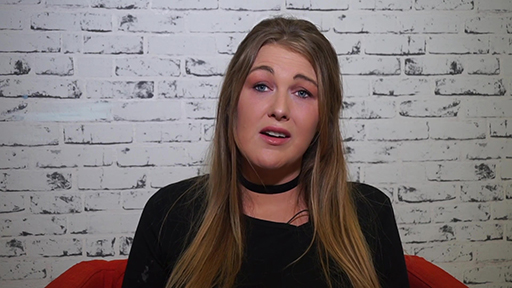
Transcript
I was charged with assault for a baby carrot. And that was within a unit as well. We’d all sat down for dinner, the dinner had been placed in the middle of the table, I’d picked up a spoon, it was a cooked baby carrot, and I flicked it. And because it hit a staff member, the police were phoned and I was charged for assault for a baby carrot. That’s something that followed me through my life and affected me getting jobs in my career.
In this clip Charlie discusses an incident where he was caught shoplifting during a difficult time in his life when he had left care and was living in homeless accommodation. Charlie talks about the police officers' understanding of his situation and the difference this approach made to him.
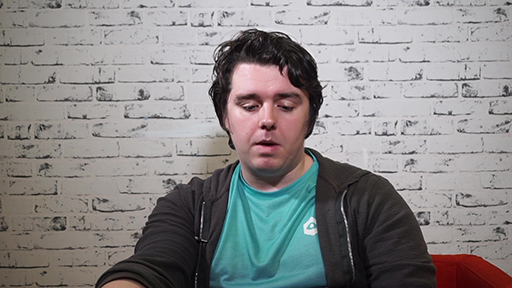
Transcript
And then the police came in and this guy, the security guard, was being really aggressive, he was like “it’s disgusting, why would people even steal things? It’s a joke. This young generation are horrible. I hope he gets punished severely. We’re definitely charging him”, and whatever. And I’m just sitting there, completely distraught. And then the police are like “right, okay.” So, instead of taking me through the store, which is what I’ve seen happen about a million times, they took me out a fire exit at the back of the store so that it wasn’t public. It didn’t give me the embarrassment of going through. They didn’t put me in handcuffs, he just had his hand around my wrist. And then put me in the back of the van and then he spoke with his colleague, the two of them spoke with each other and then they turned around and said “where are you living just now?” and I said “I’m in homeless accommodation, I’ve just been in. I’ve got no income, I’m going to lose my room and I don’t really know what to do because I don’t know how to life, I don’t know how to adult, basically.” And he was like “right, we’re just going to let you go because it seems like an act of desperation that you’ve been stealing stuff, don’t let us catch you doing it again, but sort yourself out.” And he gave me advice about how I could get money from social work until I had benefits and all this other stuff, and it was good, and it was a really good experience.
Activity 2
Having watched both videos, make some notes (in your learning journal or in the box below) about the differences in the responses to Dionne and Charlie’s behaviour. Some things to consider might be:
- How you would respond if your child flicked a carrot at you
- What a fair response to Dionne’s situation might have been
- The attitude of the security guard compared to that of the police officer
- Your reaction to a disclosure of a conviction by a student
Educational attainment
The impact of a disrupted education for Care-Experienced people can profoundly shape their adult lives. Educational attainment is strongly linked to health and economic outcomes.
The current care system means that meetings and appointments such as Children’s Hearings are scheduled during school hours and young people may miss important time to study and bond with their peers. The recent Independent Review of Care concluded that Care-Experienced young people should not be taken out of school or class for these meetings (Independent Care Review, 2020).
There is a correlation between placement moves and the level of achievement at school – the less you move, the better you will do and conversely, more placement moves have a negative impact.
Only 12% of looked after young people leave school with a Higher (SQCF 6) level qualification, compared with 62% of their peers in 2017–18 (Scottish Government, 2019).
If a young person is placed in a setting that can provide them with the stability and care they need, they can go on achieve at school.
In the video below, Lee talks about the long-term challenges caused by a disrupted education.
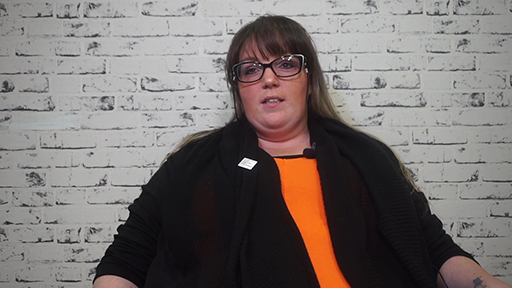
Transcript
Not being able to sit the maths at the time when I needed it is obviously causing a barrier now because it’s one of your fundamental ones like English, maths, science, these are the things that you mostly need, and most people will put the restriction on you that you need to have maths to get into any sort of further education, higher education. So, currently it’s causing a barrier, and now as an adult it’s quite expensive to actually get that qualification now; so it is causing a big barrier.
School exclusions
Care-Experienced young people are more than six times more likely to be excluded from school than their peers (Scottish Government 2018). Some looked after young people are excluded from multiple schools. This can have a disruptive impact on their learning.
The Independent Review of Care concluded that schools and local authorities must do everything required to support children to build positive relationships at school and maintain attendance, engagement and learning in a meaningful and supportive way. This includes an end to exclusion from school and other actions that can exacerbate trauma (Independent Care Review, 2020).
Leaving school
Many individual children and young people with care experience do well in school and have positive experiences of education. However, when taken as a whole group, educational outcome indicators show that the gap between looked-after children and other children's attainment in school remains unacceptably large.
In Scotland, 44% of looked after young people leave school as soon as they can – at 16 or younger. In comparison, only 11% of all school leavers leave before they’re 16 years old (Scottish Government 2019).
Prior to the Children and Young People (Scotland) Act in 2014, formal care was only provided up to the age of 16, when young people were considered to be adults. This contributed to early school leaving, as teenagers were learning to live independently.
Case study: Jenna
Jenna ran away often from the residential placement and was eventually placed in a secure unit, with very little support or encouragement in terms of her education. Jenna missed a significant amount of schooling at this time in her life. She remembers that she was good at school in her early years, but the lack of support and the amount of emotional turmoil she experienced made it very difficult for her to prioritise her studies.
Emerging from the secure unit, an attempt was made to integrate Jenna back into mainstream schooling at the local high school. There was little support given, and she felt like an alien. She remembers standing outside of the school, in her uniform, with no one there to accompany her in.
Jenna then spent a year in a residential school, before going into foster care in Scotland. Over a couple of years, she gained qualifications at standard grade level before leaving school at fifteen. She does not remember higher education ever feeling like an option for her, or anyone suggesting it as a possibility.
Activity 3
What barriers to further and higher education can you identify in Jenna's story?
Make notes in the box below or in a learning journal if you're using one. What access programmes are you aware of in your university or partner institutions that could have supported Jenna back into education?
Housing and homelessness
Care-Experienced adults are more than twice as likely to have experienced homelessness than the general population (Independent Care Review, 2020).
7% of homeless applications are made from adults who have been previously looked-after adults (Scottish Government, 2018).
A problem with the current system is that young people leaving care sometimes must declare themselves homeless in order to access supports. This could mean they are living in a foster home but are approaching 21 and must jump into the homeless system. However, significant improvements are being made to give Care-Experienced people their own system to avoid the homeless support system.
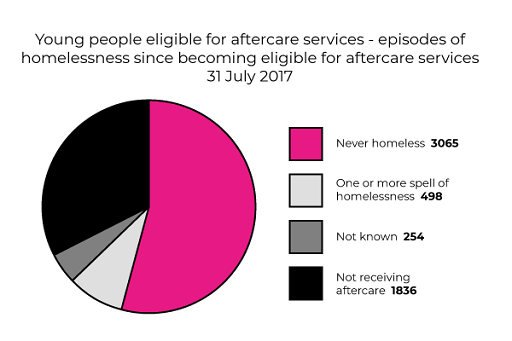
In the video, Lee talks about her experience of homelessness while at school.

Transcript
When I was fifteen, I was sitting my Standard Grades, but at that time I was living homeless in the streets, and I was sitting my Standard Grades when I was sleeping at the beach, and then I was going school, getting washed in the river in the morning. I managed to get seven Standard Grades out of the eight, the only one that I kind of missed is an important one, which is obviously my maths.
After my Standard Grades, I did try to gain some semblance of a life and I actually applied to university at eighteen, but life was really about survival at that point, and between going back into the homeless system and attempting suicide, I just wasn’t in the proper place for it. So, it didn’t matter that I had been accepted, I just wasn’t able to emotionally support myself to be able to attend university at that time.
Those attending school, college or university may reside in a variety of settings, such as foster care, with their birth family, in a residential setting but also sometimes in homeless accommodation. University halls of residence can be a lifeline for Care-Experienced people, especially those with experience of homelessness or at risk of becoming homeless. Some Care-Experienced students require accommodation outside of term time as their alternative would be homeless accommodation.
Jayde experienced homelessness while at university. Here she describes how she got support to move into student halls.

Transcript
So, I didn’t understand my care experience until very recently, until about third year of uni. It got to a point where I was homeless and I was sleeping in my car, and just here, there, and everywhere. And I was just open about my experiences of not really having anywhere to go, and that’s when I met somebody at uni that said “why can’t you live at home?” and “have you ever had social work involvement?” and that’s when it actually came to be apparent. So, I actually never self-disclosed ad being care experienced. I got signposted to the wellbeing team, the Care Experience Officer, I think she’s also part of the Corporate Parenting team, and she really helped me and managed to secure me a place in halls, pretty, basically, instantly.
Mental health and trauma
Due to the nature of the care system, children and young people often come in at a point of crisis in their life and this can have long-term effects on their mental health.
Care-Experienced young people are more than one and a half times more likely to experience anxiety and other mental health issues. In general, Care-Experienced people are twice as likely to have poor health (Independent Care Review, 2020). In a report from 2014, it was identified that 45% of looked after children and young people (aged 5–17) in Scotland had a diagnosable mental health problem (CELCIS, 2014).
There are a variety of reasons why a child or young person would enter the care system. In 2018/19, 84.5% of referrals to the Children’s Reporter were on care and protection grounds (SCRA, 2020). Care and protection referrals can include emotional abuse, physical abuse, sexual abuse and neglect. Children and young people coming into care may have already experienced developmental and relational trauma and have often lived through multiple, overlapping and co-occurring traumas, losses and stressors (Treisman, 2017). These experiences and traumas can have a lifelong impact as they grow older.
The experience of coming into care may bring positive changes, but for some this change can bring new worries and concerns as everything and everyone is unfamiliar. If young people are moved around a lot, they may give up on making new friends and relationships as they find it difficult to see the point of them if they’re just going to move. Fewer moves and strong meaningful relationships can have a significant impact on a young person’s wellbeing and in many cases on their mental health.
In the video, Megan talks about her experience of mental health issues while at university and the support she received.
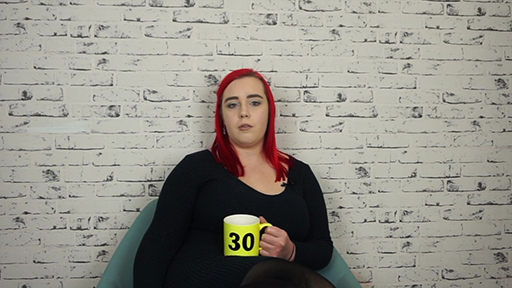
Transcript
I got quite depressed and I dropped out of university. I just felt ashamed because I was a girl who was going to go to university and be fine, and I got the grades to prove that I was clever enough. So, when I dropped out of uni and I felt like I was adding to the statistics that said care experienced aren’t going to be able to achieve what they want to, that was quite difficult for me. The Care Experience Coordinator at uni kept in touch, though, during the time that I was out, and supported me to come back the next year, which was really great. They also got me some mental health support on campus, and I got disability arrangements, so flexibility in attendance. Because when I came back, even though I knew that I should be there, I’m clever enough and I want to do the course and I’m capable of being here, I still felt like the odd one out, so that caused a lot of anxiety and I couldn’t attend classes because I felt that people were then noticing when I was missing, because my hair’s quite identifiable. So, people were starting to know that I wasn’t there much, and that felt quite stigmatising to be recognised to not be attending, maybe have some mental health issues going on, and also coming from being in care.
Co-ordinated Support Plan
The Scottish Government introduced duties for local authorities to ensure that looked after children’s rights are being upheld so that they can fully benefit from their school education.
Under these duties, there is a legal presumption that looked after children have additional support needs, unless proven otherwise. Therefore, every looked after child must be assessed for a Co-ordinated Support Plan (CSP).
Some children and young people with additional support needs require input from a number of different services. Young people may have input from social work, health services, education and others. A CSP makes sure that these services work together to give a young person the support they need to be able to properly benefit from their education.
A CSP outlines:
- the additional support needs of the young person
- objectives that have been set for them to achieve
- the support they need to achieve these objectives.
As of 2015, only 6,374 (51%) of the 12,533 looked after children with additional support needs have been assessed for a CSP, while only 368 were deemed to need one.There is a wide variation in practice between local authorities.
Activity 4
While universities aren't usually part of a Co-ordinated Support Plan, it might be useful to look again at what it includes:
- the additional needs of the young person
- objectives that have been set for them to achieve
- the support they need to achieve these objectives.
Make some notes about what support needs a Care-Experienced student in your university might have. Would it be helpful to develop some sort of support plan with them? Maybe this is something that already happens. If you're not sure, have a look at the information for Care-Experienced students on your website or speak to someone in your Student Support team.
Here are a few things the university might think about putting in place. What others can you think of? You could revisit this section (or add to your reflection journal) after you’ve studied the next section.
- accommodation over the holidays
- mentoring support
- counselling.
Positive outcomes
A positive outcome for school leavers is considered to be participation in education, training or employment. 76% of looked after young people (defined as those looked after for the entirety of the reporting year) are in positive outcomes nine months after school, compared with 93% of their peers (Scottish Government, 2019).
Among those aged 19–21 who are eligible for aftercare (the legal duty of local authorities to prepare young people for leaving care or ceasing to be looked after, as well as providing advice and assistance):
- 30% were not in employment, education or training
- the status of a further 16% was unknown.
Access to Modern Apprenticeships
In 2018/19, 1.5% of people who started a Modern Apprenticeship (MA) self-identified as Care-Experienced.
For this group, 58% successfully completed their qualification, compared to 76% for their non-looked after peers (Skills Development Scotland, 2018).
Enhanced funding is available for employers who take on Modern Apprentices with care experience. This funding is available up to the age of 29, allowing Care-Experienced people more time to access MA opportunities. This longer timescale is important as the impact of care can be lifelong, and opportunities to engage in education, employment or training can come later in life.
Skills Development Scotland is keen to ensure that MAs are taken up by a diverse population, and within their equalities work there is a drive to ensure more Care-Experienced people achieve an MA. The enhanced funding is a tool to support this work.
Access to college
Colleges are very important access routes for those with care experience, especially as their school leaving age is considerably lower than their peers. Scottish Government data shows that 38% of looked after children leaving school started a Further Education course at a college. This is higher than the percentage for all school leavers at 23%.
Case study: Jenna
When she was in her early twenties, Jenna decided that she wanted to do something with her life. She was living in Scotland again and undertook an NC in Horticulture. She picked this course as it was hands on, vocational, a different style of learning from her previous difficult experience of academic study.
Applying to college was scary for Jenna. She felt unprepared for the emotions and feelings which the process brought up for her. She notes how important it is for colleges and universities to understand that for many care-experienced people, re-entering into education after having spent a significant time away can be daunting, triggering and overwhelming.
At age 30 Jenna matriculated at a traditional university. As she was over 26, she did not qualify for financial support at the time. She describes feeling as though she was not on the radar, invisible, and feeling like a scared teenager. As a mature student, she felt a pressure to be ‘sorted’, and a positive role model for younger students. She observed younger students who were fresh from school who had been supported to learn vital skills such as study planning. Jenna cannot recall a time where she had someone sit beside her and support her with homework or planning her learning. She strives to support her own son in this way now, as she recognises how important this support is.
Activity 5
Articulating from college into university is an important route for Care-Experienced students. Are you aware of your university’s policies on recognising credit obtained at college? Have a look at your university’s website or speak to colleagues to find out. Make some notes (in your learning journal or the box below) and we will revisit this in the next section.
Access to university
Only 4% of children who have been in care for a full year enter higher education after leaving school, compared with 39% of all school leavers (Scottish Government, 2019).
While the rate of transition for young people is low, we are beginning to understand more about the extra time and support required for some learners with care experience to access higher education through different routes, such as college. The number of Care-Experienced people progressing to university is therefore higher than this statistic might suggest (CELCIS, 2018).
Some people assume that Care-Experienced people have low educational aspirations but it is more accurate to say that many don't know what is possible for them beyond compulsory education (Sosu and Ellis, 2014).
Widening access involves communicating to Care-Experienced people that university is an option for them, and that specific support is in place to aid their progression. Care-Experienced people who access university are often the first in their family to attend so raising expectations and offering information, advice and guidance is essential.
In the video, Lee describes her journey into higher education.

Transcript
and at thirty I decided to jump straight back into a HNC because I wanted to do better for my children. So, it was for them at first that I decided to get back into education.
When it came to applying for uni, that wasn’t something that I had intended to do. When I made the decision to go back into education, it was purely just get my life together kind of thing, start being better. But because the rest of the class were doing it and the lecturers gave us time to fill in the application in class one day, they were kind of talking about the progression on, the natural progression for that course, so I thought I’ll just do it anyway, and I put in the application because the rest of the class
Widening access involves communicating to care-experienced people that university is an option for them, and that specific support is in place to aid their progression. Care-experienced people who access university are often the first in their family to attend so raising expectations and offering information, advice and guidance is essential.
Reflection
In this section, we heard from students about their experiences of being in care and how this continues to impact on their education and other outcomes. Look back at the notes you’ve made in this section and think about your earlier reflection – how would you feel if this were your child?
Activity 6
Many of the experiences discussed in this section occurred before the student accessed higher education but there are others that the university could offer help and support with. Here are a few things the university might think about putting in place.
- accommodation over the holidays
- mentoring and support
- counselling.
What others can you think of? Make some notes here or add to your learning journal. You could revisit these notes after you’ve studied the next section.
Now continue to Session 4 Higher Education.

